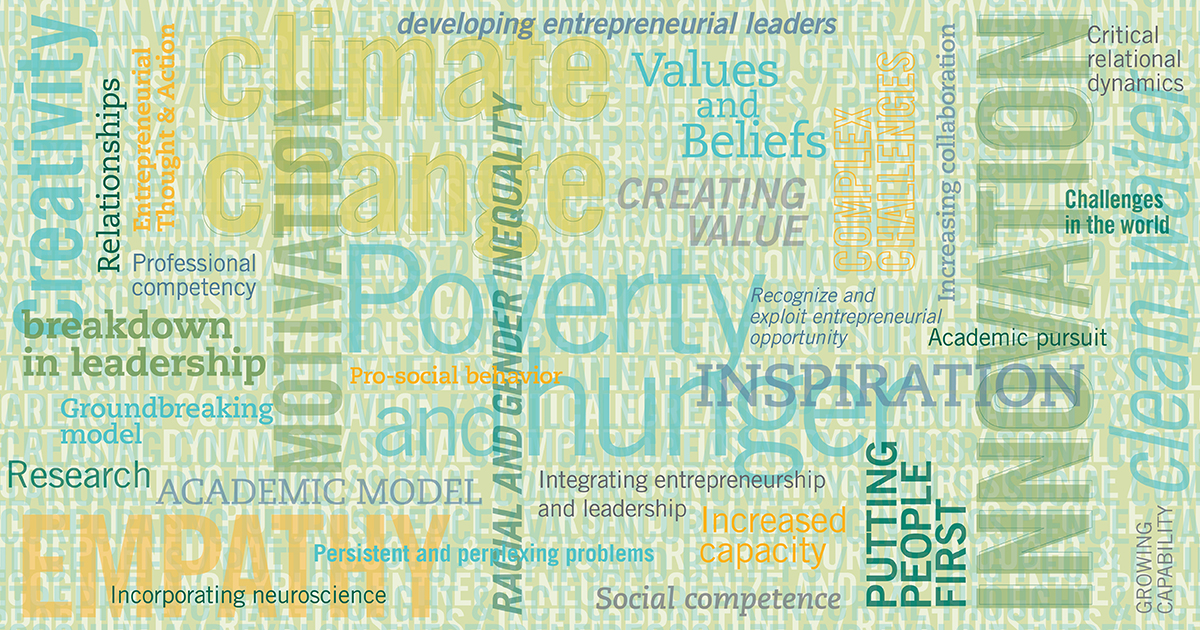Why Entrepreneurial Leadership Matters

War and pandemic. Climate change and clean water. Poverty and hunger. Racial and gender inequality.
The endless list of complex challenges confronting humanity today is daunting. Plus, many are persistent problems that have plagued the planet for decades or longer. The real problem isn’t the problems themselves, according to Babson College’s Scott Taylor. No, it’s the leadership required to solve them.
“One thing that keeps me up at night, as a leadership scholar, is why do we have these long-standing problems and challenges in the world?” says Taylor, professor of organizational behavior and the Arthur M. Blank Endowed Chair for Values-Based Leadership at Babson. “We’re not able to bring together the individuals, the resources, the knowledge, the capability, and don’t have the influence sufficient to work through these very complex issues. There’s a breakdown in leadership, so there’s a major need.”
It’s the entrenched models of leadership—not the leaders themselves, Taylor says—that are failing society. There’s an urgent need for a new model of leadership. Babson’s research, led by Taylor, has created that model.
To solve the most perplexing problems, he says, the world needs entrepreneurial leadership.
A Groundbreaking Model
The first definitions of entrepreneurial leadership date to the early 1990s, and at the forefront of the concept’s development have been Babson faculty such as Danna Greenberg, the Walter H. Carpenter Professor of Organizational Behavior whose book, The New Entrepreneurial Leader: Developing Leaders Who Shape Social and Economic Opportunity, was published in 2011. Since then, entrepreneurial leadership has increased in popularity, especially as a professional competency and academic pursuit.
As the longtime No. 1 school for entrepreneurship education, Babson College is perfectly positioned to take the lead on entrepreneurial leadership. With a $50 million donation from Arthur M. Blank ’63, H’98 in 2019, Babson launched The Arthur M. Blank School for Entrepreneurial Leadership.

Scott Taylor, professor of organizational behavior and the Arthur M. Blank Endowed Chair for Values-Based Leadership at Babson
“This is our DNA. We live it, we practice it, we teach it,” Taylor says. “We’re uniquely qualified because of that history, those connections, those relationships, but I think there’s another piece to it: We want to be able to help the world solve these complex issues.”
At Babson’s Blank School, Taylor has led the extensive work of his Babson colleagues to research and advance entrepreneurial leadership, which is taking a major leap forward this year. Taylor will be presenting the research work of the Blank School this summer to the Academy of Management’s Annual Meeting, the top conference for management and organization scholars. Also, the team’s academic paper on entrepreneurial leadership will soon be submitted to a top-tier academic journal.
Most notably, Babson’s Blank School research has created the first academic model to explain entrepreneurial leadership. Existing definitions primarily are rooted either in entrepreneurship or leadership. Babson’s model, though, aims to extend and clarify the definition by integrating the two fields and incorporating neuroscience in groundbreaking ways.
In layman’s terms, Taylor describes entrepreneurial leadership as “the ability to help people in an influential way to have an increased capacity to recognize and exploit entrepreneurial opportunity.”
“We’re not just talking about businesses here,” Taylor says. “We’re talking about solving complex problems, establishing sustainable organizations that impact the environment, economy, and society.”
Putting People First
The traditional view of leadership often relies on a singular heroic figure—a commanding leader directing followers toward a common purpose. And, existing definitions of entrepreneurial leadership borrow from “transformational leadership,” which focuses on leaders capable of changing a social system or group of people in some way.
“But, that foundation of transformational leadership on which entrepreneurial leadership is built is now a little shaky,” Taylor says. What’s missing is the relationships among people. Babson’s model of entrepreneurial leadership focuses on critical relational dynamics, incorporating research on human motivation. “Science has helped us understand why people do what they do, and what makes for effective performance at the individual, team, or organization level.”
For starters, entrepreneurial leaders must have an internal clarity. Confidently guided by their values and beliefs, they are better able to focus outwardly on others. “Our model explores how that happens from a motivational, dynamic standpoint,” Taylor says.
“By developing entrepreneurial leaders, measuring their capability and impact, we’re going to be more intentional and effective in promulgating Entrepreneurial Thought & Action® in ways I don’t think we’ve even dreamed that we could do a few years ago. I think what we will see will be extraordinary.”
Scott Taylor, Arthur M. Blank Endowed Chair for Values-Based Leadership
Successful entrepreneurial leaders also must display and foster empathy among others. Recent research shows that the empathetic network in the brain is tightly linked to innovation, creativity, and pro-social behavior. However, when the empathetic network is activated, the brain’s analytical network is suppressed, and vice versa.
“I believe entrepreneurial leaders move back and forth in those networks more quickly than other leaders, and we can increase that efficiency,” Taylor says. “That type of knowledge needs to influence the way we think about leadership from a relational standpoint and what one needs to do to inspire and enable others and engage their intrinsic motivation for performance.”
Developing Entrepreneurial Leaders
More than 40 years ago, Babson revolutionized entrepreneurship, introducing it as an academic discipline that could be learned and developed. Now, the College is poised to do the same for entrepreneurial leadership.
The necessary skills of entrepreneurial leaders, including cognitive flexibility and social competence, also can be developed and even measured, Taylor says. Babson’s model includes a process to grow the capability of entrepreneurial leaders, increasing collaborative efforts to tackle complex problems and create value.
READ MORE: The Problem Solvers
The results could be dramatic.
“By developing entrepreneurial leaders, measuring their capability and impact, we’re going to be more intentional and effective in promulgating Entrepreneurial Thought & Action® in ways I don’t think we’ve even dreamed that we could do a few years ago,” Taylor says. “I think what we will see will be extraordinary.”
So, with such complex, persistent problems causing sleepless nights, can entrepreneurial leaders really change the world?
Taylor doesn’t hesitate to answer: “Absolutely.”




